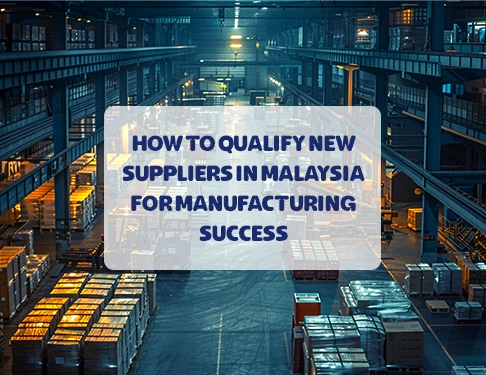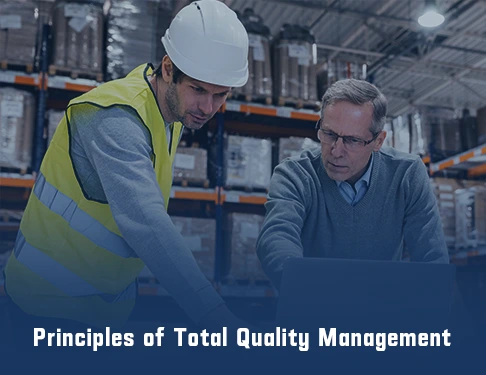Guide to Qualifying New Suppliers in Malaysia for Manufacturing Success
Malaysia is a premier manufacturing hub in Southeast Asia. According to the Malaysian Investment Development Authority (MIDA), “Malaysia, with its extensive trade....
By AMREP | Posted on September 14, 2025
As a first-time buyer, collaborating with suppliers in Thailand takes more than just picking a factory. You need to understand Thai business culture and carefully check supplier certifications. Quality control and inspections should always be a top priority. Be prepared for language barriers and expect a preference for in-person meetings and relationship-driven networks. Set clear agreements on payment terms, quality standards, and inspection procedures. Learn the legal framework and customs processes to build strong, reliable partnerships from the beginning.
By combining cultural awareness, thorough vetting, robust contracts, and consistent quality checks, you can establish reliable supplier partnerships in Thailand that foster long-term growth and development.
This guide walks you through each step so you can confidently navigate your first supplier partnership in Thailand.
Partnering with suppliers in Thailand for the first time requires careful attention to several key areas that will determine the success of your buyer–supplier relationship. Let's explore them one by one:
Doing business in Thailand requires a deep understanding of local culture and a genuine respect for local practices. The way you communicate and build relationships can have a significant impact on negotiations and long-term success.
Success in Thailand begins with cultural respect. Patience, courtesy, and relationship-building are as important as price and product quality.
Locating the right supplier is the foundation of a successful sourcing strategy. First-time buyers should approach this process with caution and due diligence.
Proper vetting helps you avoid costly mistakes. Always verify credentials and confirm you're dealing directly with the manufacturer.
Clear and effective communication is the foundation of a smooth sourcing process in Thailand. Misunderstandings can easily arise if instructions are not delivered carefully, especially when dealing with complex product specifications.
Strong communication practices reduce risks, prevent errors, and create a smoother buyer–supplier experience.
Negotiation in Thailand is closely tied to relationship-building, and in-person meetings often carry more weight than digital communication.
Negotiations are most successful when handled with patience, respect, and a focus on long-term collaboration.
Discussing payment terms early is crucial to avoid misunderstandings and ensure a smooth financial transaction.
Clear, written payment agreements protect both parties and reduce the chance of financial disputes.
Quality control is one of the most critical aspects of working with Thai suppliers, especially for first-time buyers unfamiliar with local production standards.
Never skip inspections and quality control that safeguard your investment and reputation.
Strong contracts protect your business and set clear expectations for suppliers.
Contracts are your first line of defence, so invest time in getting them right.
Thailand's strong logistics infrastructure makes it a regional export hub, but careful planning is still required.
Efficient logistics planning helps you stay competitive and avoid unnecessary expenses.
Beyond contracts and inspections, lasting success in Thailand comes from building strong, trust-based relationships.
Long-term success comes from partnership, not just transactions. Invest in relationships to build stability and loyalty.
Sourcing from Thailand offers many advantages, but first-time buyers often encounter challenges that can impact timelines, budgets, and relationships. Anticipating these issues helps you avoid costly mistakes.
Being prepared for these challenges with clear communication, strong contracts, and realistic expectations helps first-time buyers avoid unnecessary setbacks.
Working with Thai suppliers for the first time doesn't have to be overwhelming. By following a few best practices, buyers can mitigate risks, foster trust, and lay the groundwork for long-term success.
A cautious, step-by-step approach backed by strong documentation, third-party support, and regulatory awareness creates a solid foundation for successful sourcing in Thailand.
Thailand has steadily emerged as one of Asia's most attractive sourcing hubs, offering a mix of cost efficiency, skilled labour, and strategic advantages that appeal to global buyers. For businesses exploring suppliers outside of China or Vietnam, Thailand presents a competitive option.
Thailand's workforce is renowned for its expertise in various industries, including textiles, electronics, automotive parts, and food processing. Strong government support, favourable trade agreements, and an expanding industrial base further enhance its appeal.
Situated at the heart of Southeast Asia, Thailand benefits from well-developed logistics networks. Its proximity to key markets and access to regional trade routes make it an efficient export hub.
While China dominates in scale, Vietnam excels in rapid manufacturing growth, and Thailand offers a balance of cost competitiveness, quality inspection, and supply chain reliability. It has carved out a niche for buyers who value both efficiency and long-term stability.
With its skilled workforce, strategic location, and supportive trade environment, Thailand has become a sourcing destination that rivals regional giants while offering unique advantages for first-time buyers.
Looking to strengthen your supply chain in Thailand? Partner with AMREP Inspect's Local Resource Solutions to access skilled local professionals who understand the culture, language, and business practices, helping you bridge gaps, reduce risks, and manage suppliers more effectively.
Contact Us To See What We Can Do
Call Us
Mon - Sat 9.00 - 18.00
Sunday Closed


12 - May 2025
12
May
2025
Malaysia is a premier manufacturing hub in Southeast Asia. According to the Malaysian Investment Development Authority (MIDA), “Malaysia, with its extensive trade....

22 - April 2025
22
April
2025
Healthcare is rapidly evolving, ensuring consistent and high-quality patient care. Total Quality Management (TQM) in healthcare is more than just a buzzword—it is a powerful....

16 - April 2025
16
April
2025
Total Quality Management (TQM) is a mindset that involves everyone in the organization working toward a common goal: achieving excellence through quality. From....
